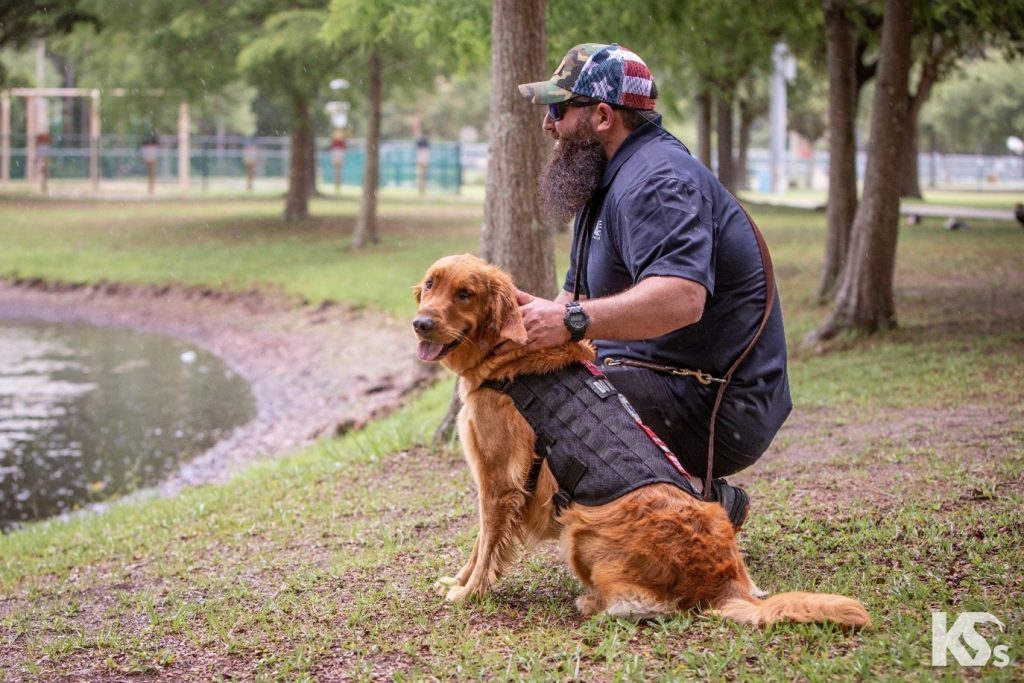K9s For Warriors stands as a transformative force, dedicated to equipping Veterans across the United States with a lifeline of support. Through intricate training and compassion, these Service Dogs transcend mere companionship, becoming invaluable partners in the recovery journey of our military Veterans. In the following article, K9s For Warriors illustrates how these exceptional canines carve a path towards healing and renewal for the heroes who've served our nation.
Post-Traumatic Stress Disorder (PTSD), a type of anxiety disorder, is one of the most debilitating psychological conditions anyone can experience. It can develop after experiencing a traumatic event that threatens one’s safety and well-being.
It’s no surprise that a large percentage of military members and Veterans are affected by PTSD and other mental health issues. The psychological aftermath of war, combat exposure, and
Military Sexual Trauma (MST) are just a few contributing factors.
K9s For Warriors explains that sufferers may experience insomnia, nightmares, vivid flashbacks, intrusive thoughts, and painful physical sensations among many other symptoms.
But how is this crippling disorder treated?
Common
treatments for PTSD include either short-term or long-term medications, and various types of therapy. However, in recent years, Veterans with the condition have opted for a complementary intervention that has demonstrated a profound therapeutic role in the treatment of PTSD - the use of Service Dogs.
Transcending conventional therapeutic methods, PTSD Service Dogs aid in their owner’s journey toward healing and recovery with renewed dignity and independence
K9s For Warriors explores roles of Service Dogs for these individuals, and how these canine allies help heal invisible injuries.
K9s For Warriors - A Healing Partnership
“Each Veteran-Service Dog partnership is unique and multi-dimensional”, notes researchers from the National Library of Medicine.
They recently conducted a
study about how Service Dogs help mitigate symptoms of PTSD in military Veterans. 82 current and former military members were partnered with a PTSD Service Dog. The participants were evaluated prior to getting their dog and again 3 months after spending time with their Service Dog.
The participating Service Dogs were trained to carry out specific tasks to offer help and bring relief to their owners, including:
- Alerting to or interrupting anxiety by nudging or placing their head on their owner’s lap
- Calming or providing comfort from anxiety by leaning against or laying on top of its owner
- Blocking or creating space by standing in front of their owner in crowded areas
- Standing behind their owner to cover and signal that someone was approaching
- Interrupting a nightmare by gently waking their owner up
The study’s results showed that on average, most of the Veterans spent about 80% of their day with their Service Dog. The tasks that the canines performed the most were calming or providing comfort for anxiety (52%) and alerting to or interrupting anxiety (18%).

 Redefining Support: Service Dogs as Silent Saviors
Redefining Support: Service Dogs as Silent Saviors
These gentle allies offer more than companionship with no judgment, which in itself is already incredibly healing and therapeutic. They benefit their owners in a range of other ways, including:
• Providing Emotional Healing and Wellness
K9s For Warriors states that Veterans with PTSD commonly experience anger, agitation, hypervigilance, emotional numbness, and restlessness among other issues. The simple joys of having a dog as a companion and the calming presence the Service Dog provides helps suppress these negative emotions and evokes feelings of happiness, inner peace, and positivity.
The aspect of caring for their Service Dog also gives the Veteran a sense of responsibility, which in turn gives the feeling that the Veteran has another reason to live and something to look forward to.
• Alleviating Solitude and Isolation
Numerous combat Veterans with PTSD have reported feelings of isolation after they return home. They feel alone, misunderstood, and scared to socialize. Having a Service Dog changes this. Service canines encourage social activity and reintegration.
• Offering Unconditional Love and Acceptance
K9s For Warriors explains, as many dog owners would agree, Veterans report they are able to bond with their Service Dog in a way that has not been possible with people, particularly after coming home from service. One thing they appreciate is they don’t have to talk about their problems or explain themselves – their Service Dog instinctively knows how they are feeling and instantly provides comfort.
Service Dogs persist as unwavering allies in the profound journey of recovery for Veterans grappling with PTSD. Beyond the invaluable services they offer, these remarkable companions wield the power to transform the lives of their Veteran, effecting healing that transcends the realm of the visible eye.

 Redefining Support: Service Dogs as Silent Saviors
Redefining Support: Service Dogs as Silent Saviors